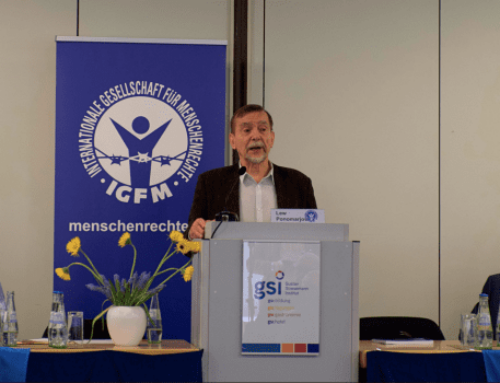Monitoring of criminal proceedings of Alexandr Schegolev (hearing of October 16, 2020)

On October 16, 2020, a hearing was held in the Shevchenko District Court of Kiev in the case of the ex-head of the Security Service of Ukraine (SBU) of the city of Kiev and the region, Alexandr Shchegolev, who is accused of organizing the violent dispersal of protests on February 18-19, 2014.
On this day, the term of the measure of restraint in the form of a personal obligation expired.
Prosecutor O.O. Suprun has filed a petition in advance to change the measure of restraint from a personal obligation to round-the-clock house arrest. The prosecutor O.N. Garkusha arrived at the hearing and read out this petition.
The prosecution referred to the same risks in the petition that the ISHR observers had previously described in the case reports, namely:
– to hide from the court:
1) since the accused faces a sentence of life imprisonment, this may induce him to commit actions that are aimed at evading criminal liability. But, the ECtHR notes that the risk of absconding cannot be measured only on the basis of the severity of a possible sentence, at least for further stages of trial. The risk must be assessed taking into account several relevant factors, in this context should be, in particular, assessed personal data, moral qualities, property associated with the respondent State, in which a person is prosecuted, as well as his international contacts” (paragraph 91 of the judgment in the case “Miminoshvili v. Russian Federation”).
2) the accused committed the crime (based on the text of the petition) in complicity with other heads of law enforcement agencies who are hiding from the court, are on the wanted list and who have been detained: A. Yakimenko, V. Totsky and others. The accused kept in touch with them, and there are real risks that accomplices may help him abscond from court. In the context of the aforementioned, the ECtHR notes that the behavior of an accomplice in a crime cannot be a decisive factor in assessing the risk that the accused will abscond. Such an assessment should be based on the personal characteristics of the accused” (paragraph 70 of the judgment in the case “Fedorenko v. Russian Federation”).
3) earlier the accused lived in Donetsk, where he held leadership positions and has strong social ties that can be used to avoid criminal liability.
– to destroy or hide evidence that is relevant to criminal proceedings, which means there is a risk of actions that will interfere with the identification of victims.
– to illegally influence victims and witnesses. Since A. Shchegolev held leading positions, he has special knowledge and skills. In particular, he can use connections with the SBU, the Ministry of Internal Affairs of Ukraine and other state and law enforcement agencies that can illegally influence persons interrogated or subject to interrogation as victims or witnesses. At the same time, the prosecutor drew attention to the fact that earlier at the hearings the victims said that they were afraid of committing illegal actions by A. Schegolev and other persons involved in this case.
– other way to interfere with criminal proceedings. The prosecutor indicated that earlier A. Shchegolev had given false testimony, tried to obstruct the clarification of the real circumstances. The prosecutor drew attention to the repeated violations of the order established in the court, for which the court made remarks to the accused (for example, at the hearing of March 7, 2019).
Therefore, the prosecutor believed that all the alleged risks continue to exist and may hinder the effectiveness of the trial. Under such circumstances, softer measures of restraint, in his opinion, cannot provide and give an opportunity to control the place of stay of A. Shchegolev. The prosecutor indicated that only a measure of restraint in the form of house arrest with the use of a means of control would help to ensure further consideration of the case.
As indicated by the ECtHR, house arrest, taking into account its degree and duration, is considered a deprivation of liberty within the meaning of Art. 5 of the Convention (paragraph 104 of the judgment in the case “Buzadzhi v. Republic of Moldova”). The court ruled that appropriate and sufficient reasons are necessary for this type of deprivation of liberty, as in the case of pre-trial detention (paragraph 113).
The lawyer V. Rybin objected to the satisfaction of the petition. He considers that the application did not indicate sufficient reasons for changing the measure of restraint.
It should be noted that the prosecutor in his petition indicated the same reasons that were previously considered by the court. The court has repeatedly come to the decision that there is no reason to change the measure of restraint. The International Society for Human Rights also notes the fact that A. Schegolev has been under a personal obligation for a long period of time and the prosecution has never been able to point out the factual violations by the accused of his procedural duties, always guided by assumptions.
As a result of the hearing, the court extended the measure of restraint in the form of a personal obligation for another 60 days, that is, until December 12, 2020, and refused to satisfy the prosecutor’s request.
The next court hearing is scheduled for October 21, 2020. The ISHR will continue to monitor this proceeding.








Leave A Comment